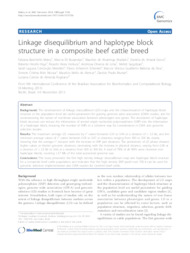Linkage disequilibrium and haplotype block structure in a composite beef cattle breed.
Linkage disequilibrium and haplotype block structure in a composite beef cattle breed.
Author(s): MOKRY, F. B.; BUZANSKAS, M. E.; MUDADU, M. de A.; GROSSI, D. do A.; HIGA, R. H.; VENTURA, R. V.; LIMA, A. O. de; SARGOLZAEI, M.; MEIRELLES, S. L. C.; SCHENKEL, F. S.; SILVA, M. V. G. B.; NICIURA, S. C. M.; ALENCAR, M. M. de; MINARI, D. P.; REGITANO, L. C. de A.
Summary: Background: The development of linkage disequilibrium (LD) maps and the characterization of haplotype block structure at the population level are useful parameters for guiding genome wide association (GWA) studies, and for understanding the nature of non-linear association between phenotypes and genes. The elucidation of haplotype block structure can reduce the information of several single nucleotide polymorphisms (SNP) into the information of a haplotype block, reducing the number of SNPs in a coherent way for consideration in GWA and genomic selection studies. Results: The maximum average LD, measured by r2 varied between 0.33 to 0.40 at a distance of < 2.5 kb, and the minimum average values of r2 varied between 0.05 to 0.07 at distances ranging from 400 to 500 kb, clearly showing that the average r2 reduced with the increase in SNP pair distances. The persistence of LD phase showed higher values at shorter genomic distances, decreasing with the increase in physical distance, varying from 0.96 at a distance of < 2.5 kb to 0.66 at a distance from 400 to 500 kb. A total of 78% of all SNPs were clustered into haplotype blocks, covering 1,57 Mb of the total autosomal genome size. Conclusions: This study presented the first high density linkage disequilibrium map and haplotype block structure for a composite beef cattle population, and indicates that the high density SNP panel over 700 k can be used for genomic selection implementation and GWA studies for Canchim beef cattle.
Publication year: 2014
Types of publication: Journal article
Unit: Embrapa Dairy Cattle
Observation
Some of Embrapa's publications are published as ePub files. To read them, use or download one of the following free software options to your computer or mobile device. Android: Google Play Books; IOS: iBooks; Windows and Linux: Calibre.
Access other publications
Access the Agricultural Research Database (BDPA) to consult Embrapa's full library collection and records.
Visit Embrapa Bookstore to purchase books and other publications sold by Embrapa.

